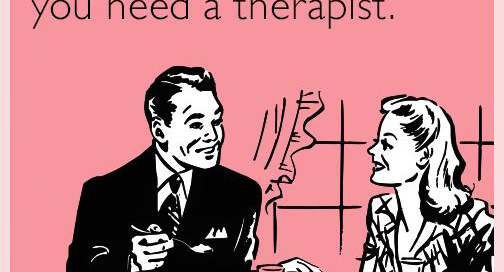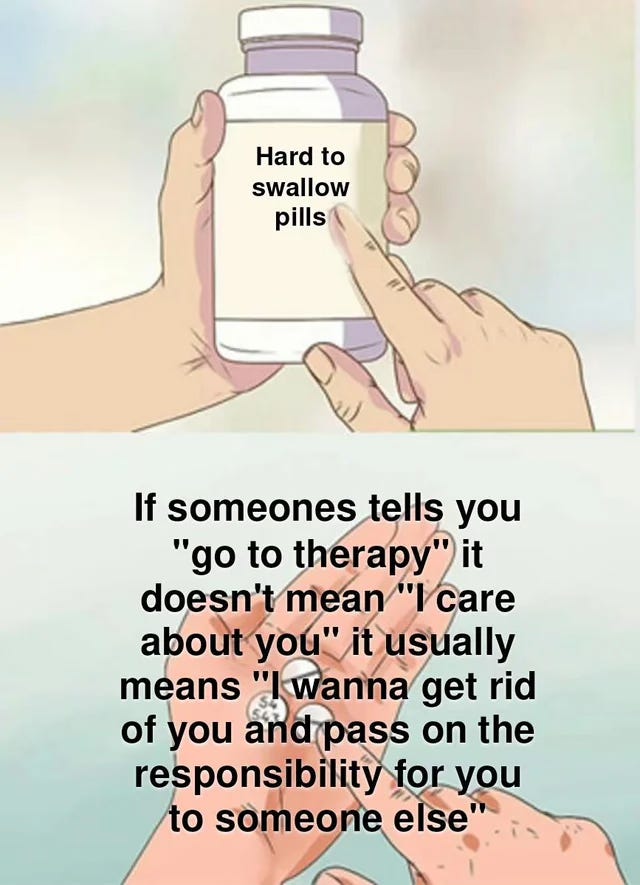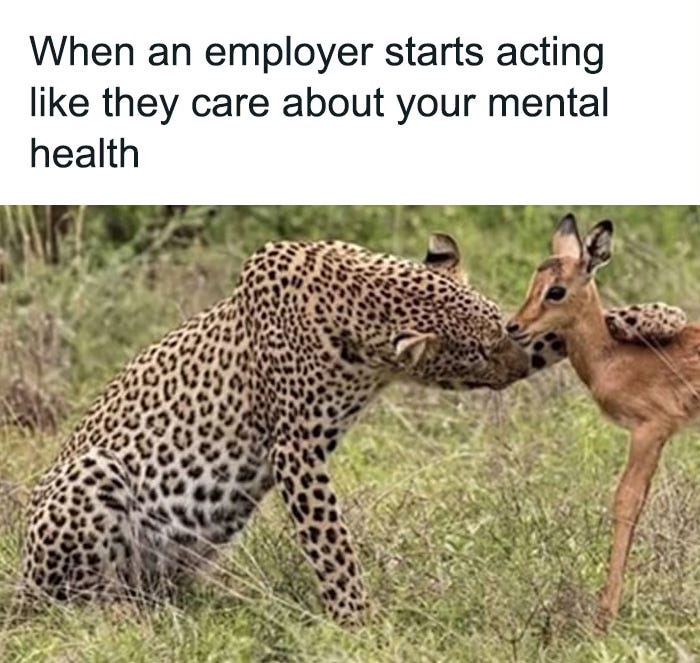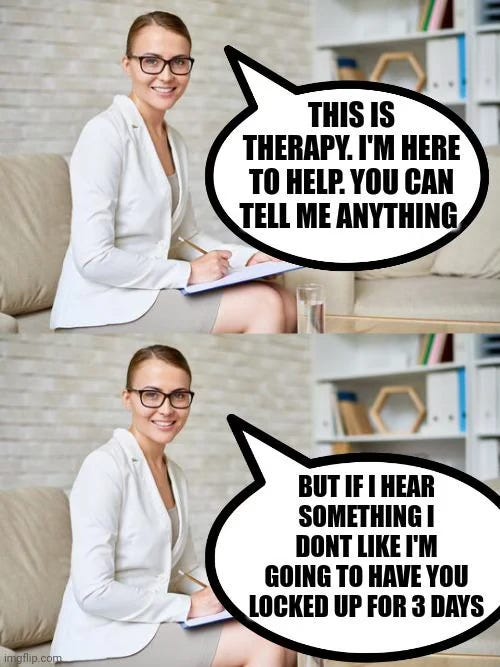"You need therapy."
Three words that have become the nuclear option in modern relationships. The conversation-ending atomic bomb. The ultimate mic drop in any disagreement. The sophisticated way of saying "you're crazy" while maintaining the moral high ground.
Your romantic partner deploys it when your needs become inconvenient: "You should really talk to someone." Suddenly they're the enlightened, caring partner who's just trying to help, while you're the broken one who lacks the self-awareness to see your own dysfunction. They get to avoid accountability for their role in relationship problems while positioning themselves as the psychologically sophisticated party offering compassionate guidance to their clearly disturbed partner.
Human Resources wields it when your humanity interferes with productivity: "We think you'd benefit from our Employee Assistance Program." This thinly veiled liability protection allows them to appear compassionate while refusing to accommodate the basic reality that humans have lives outside the office. They've documented their "concern" for your wellbeing, created a paper trail showing they offered "support," and positioned your normal human responses to life's challenges as personal deficiencies requiring professional correction rather than organizational flexibility.
Your friend uses it to abandon you during difficult times: "Have you considered talking to someone?" The beautiful irony, of course, is that you thought that's exactly what you were doing: talking to your friend. But apparently friendship now comes with referral services instead of actual support. They get to avoid the emotional labor of being present during your crisis while appearing thoughtful and concerned, efficiently outsourcing your pain to the professionals so they can maintain their comfortable distance from your inconvenient human struggles.
Different messengers, identical message: You are the problem, and fixing you is your responsibility.
Welcome to 2025, where suggesting someone seek professional help has become our culture's universal weapon for avoiding accountability, dodging difficult conversations, and transforming normal human experiences into pathological conditions requiring professional intervention. We've systematically destroyed the very mechanism through which humans have bonded for millennia: showing up for each other during times of crisis, sitting with pain, offering presence instead of prescriptions. By outsourcing every difficult emotion to professionals, we've severed the intimate threads that weave us together as communities, families, and friends, replacing the sacred act of mutual support with sterile referral systems that keep us perpetually isolated from the very connections that could actually heal us.
I've been astounded by how many people walk into my office as casualties of this weaponized mental health culture. They've been "mandated into therapy": either to keep a partner in their relationship or because their job has made it a "condition" of continued employment. I've apparently become the mental health czar who must determine whether this person is "losing their mind," sign off on medical leave requests, report back to corporations about their psychological fitness, or somehow divine the answer to their desperate question: "What's wrong with me?"
This isn't an accident. It's the intentional consequence of a society that has systematically replaced authentic human connection with corporate-approved interactions. We've traded honest conversations for liability protection, genuine accommodation for diagnostic referrals, and the messy work of real relationships for the sterile efficiency of therapeutic mandates.
What has this weaponized mental health language replaced? The courage to say "I can't handle this situation." The honesty to admit "We want different things and maybe we're not right for each other." The maturity to acknowledge "I'm struggling with your circumstances and need to step back." The basic human decency of sitting with someone's pain without immediately pathologizing it.
Instead, we've created a culture where every difficult emotion gets medicalized, every relationship conflict gets diagnosed, and every human limitation gets therapeutically managed. We've turned the most intimate aspects of human experience—love, loss, grief, disappointment—into corporate HR problems requiring professional intervention.
This isn't compassion. It's cowardice disguised as concern, rooted in our collective terror of genuine human messiness. We've become a society so afraid of authentic emotional experience that we immediately refer any inconvenient feelings to the professionals, ensuring we never have to develop the capacity to hold space for each other's humanity.
The result? We're more isolated, more medicated, and more convinced of our own brokenness than ever before. We've traded the beautiful, difficult work of human connection for the false safety of therapeutic surveillance, creating a culture where being human has become a liability requiring professional management.
The Therapy Ultimatum
"I need to work on my attachment issues," “Alexis” told me during our first session, her voice heavy with the weight of internalized shame. "My boyfriend says I'm too needy and clingy. He says my constant need for reassurance and quality time together is suffocating him, and that if I don't get therapy to fix these codependent patterns, he can't stay in the relationship."
I watched this bright, articulate woman systematically tear herself apart, using language that clearly wasn't her own. "I know I'm too much," she continued. "I get anxious when we don't talk for a day or two. I want to spend weekends together instead of always doing separate things with our own friends. He says this proves I don't have a secure attachment style and that I'm trying to control him through emotional manipulation."
Let me paint the fuller picture: Alexis naturally craves emotional intimacy, regular communication, and shared experiences in romantic relationships. Her boyfriend thrives on independence, sporadic contact, and maintaining separate social lives. These aren't pathological patterns; they're fundamental compatibility differences in how two people experience and express love.
But rather than recognizing this basic incompatibility, Alexis’s boyfriend had weaponized pop psychology buzzwords he'd absorbed from TikTok to transform her natural way of loving into a psychological disorder requiring professional intervention. Armed with his PhD in social media psychology, he'd diagnosed her fundamental attachment style as pathological dysfunction that needed therapeutic correction.
Alexis wasn't someone with different relationship needs; she was a "codependent" person with "anxious attachment" who needed to be "fixed" before she could be suitable for love.
"He's sent me reels about anxious attachment and codependency," Alexis explained, pulling out her phone to show me the evidence. "He says he can't enable my unhealthy patterns anymore, and that loving me means holding me accountable for my personal growth."
She expected me to fix her. Wrong guy. I wasn't here to transform her into someone more convenient for her boyfriend's comfort. I was here to help her recognize that there was nothing broken about her that required fixing in the first place.
Most therapists in our pathology-obsessed culture would have jumped all over that anxious attachment bullshit, eagerly diving into her "trauma responses" and "maladaptive coping strategies." They'd have validated her boyfriend's amateur diagnosis, prescribed attachment-focused interventions, and spent months reinforcing the narrative that her natural desire for connection was indeed a psychological disorder requiring therapeutic correction. It's a perfect revenue stream: convince someone their love style is pathological, then charge them to become a different person entirely.
The sophisticated cruelty of this dynamic is breathtaking. Instead of having an honest conversation about incompatibility ("We seem to need very different things from relationships, and maybe we're not right for each other"), Alexis's boyfriend had pathologized her fundamental way of loving and positioned therapy as the only acceptable solution.
This is the therapy ultimatum in its most insidious form: transforming normal human relationship needs into psychological disorders that require professional correction. It's a perfect system for avoiding the painful reality of incompatibility while maintaining complete moral authority… and control. The person making the ultimatum becomes the psychologically enlightened partner graciously offering their problematic lover a chance at redemption through therapeutic intervention.
The Diagnostic Relationship Dynamic
We've created a generation of amateur psychiatrists who diagnose their partners, friends, and family members faster than they can update their Instagram stories. Every argument becomes evidence of someone's psychological instability. Every emotional reaction gets pathologized and medicalized.
"She's so bipolar." "He's clearly a narcissist." "You're being borderline right now." "That's such anxious attachment behavior." "You're trauma-dumping on me."
These aren't clinical observations; they're relationship power moves. They're ways of dismissing someone's perspective without actually engaging with it, of positioning yourself as psychologically superior while rendering the other person's feelings and experiences as symptoms requiring treatment.
I've watched couples where one partner has essentially appointed themselves as the other's unpaid therapist, constantly analyzing their behavior, suggesting what their "real issues" are, and prescribing therapeutic solutions for every personality trait they find inconvenient. This is emotional manipulation dressed up as psychological insight.
The beautiful efficiency of this system is that it makes the person being diagnosed wrong by default. If you accept the diagnosis and go to therapy, you're admitting you were the problem. If you resist the diagnosis, you're "defensive" and "unwilling to work on yourself," which is just more evidence that you need therapy.
It's the same psychological trap that modern psychiatry has perfected: their diagnosis is always right, and your resistance proves your mental illness. Disagree with your therapist? That's your denial talking. Question the label they've assigned you? Classic symptom of your disorder. Trust your own instincts over their professional opinion? Clearly you lack insight into your condition. You can never trust yourself when you're trapped in this system because the system has defined self-trust as pathological. You have no power, no agency, no valid perspective. You are simply the diagnosed one, forever dependent on their expertise to interpret your own experience.
When Being Human Becomes a Workplace Liability
This weaponization of mental health language hasn't stayed contained to romantic relationships; it's infected every area of our social lives, most insidiously in the workplace, where having a human life outside the office has apparently become a psychological disorder requiring professional intervention.
Not your bubbly self anymore since your mom got cancer? We're concerned about your emotional wellbeing. Sleep-deprived from caring for your sick child? Sounds like you need better stress management strategies. Going through a divorce and had to move out? Perhaps some counseling would help you develop healthier coping mechanisms. Struggling with marital problems that are affecting your concentration? The Employee Assistance Program specializes in relationship counseling. Grieving the death of a parent and your productivity has declined? Professional support can help you "process your loss" more efficiently.
This is how modern corporations have solved the inconvenient problem of human employees: Instead of acknowledging that life naturally interferes with work sometimes, they've pathologized the normal human response to extraordinary circumstances and positioned therapy as the solution to their accommodation concerns.
The mental health industrial complex has become a compliance court, determining whether your grief is "appropriate," your stress is "manageable," and your humanity is "workplace compatible." Companies get to maintain slave-like productivity expectations while appearing progressive and caring. They've discovered the perfect liability shield: suggesting therapy transforms any failure to accommodate human circumstances into documented concern for employee mental health.
The underlying message is as dehumanizing as it is clear: Your personal life is a disorder when it interferes with corporate expectations. Your natural responses to life's challenges are symptoms requiring professional correction. This corporate colonization of our emotional lives has fucked our capacity for genuine human connection, replacing basic decency with diagnostic referrals and turning the workplace into a therapeutic surveillance state where being human is grounds for professional intervention.
When Therapy Becomes Punishment
What's particularly insidious about this cultural phenomenon is how it turns therapy; which should be a voluntary journey of self-discovery, into a punishment for having feelings, opinions, or reactions that others find inconvenient.
Real therapy works because people choose it. They come seeking growth, wanting to understand themselves better, recognizing patterns that jeopardize their health. Learning new skills to face old problems. The motivation comes from within, not from external coercion disguised as care.
But when therapy becomes something you're pressured into by partners, friends, employers, or family members as a condition for maintaining relationships or social standing, it stops being therapy and becomes compliance training. It's psychological waterboarding with a mental health license.
"You can't be in my life until you get therapy" isn't an invitation to growth; it's emotional extortion.
"You need professional help" isn't an expression of concern; it's a sophisticated way of telling someone they're fundamentally defective while avoiding any actual engagement with their perspective.
"I can't enable your behavior anymore" isn't setting healthy boundaries; it's weaponizing mental health language to avoid accountability for your own role in relationship dynamics.
This is what happens when mental health becomes a weapon rather than a resource. We've created a therapeutic industrial complex that profits from pathologizing normal human experiences, turning every inconvenient emotion into a billable diagnosis, every relationship conflict into evidence of psychological dysfunction.
When we throw around diagnostic labels as relationship weapons, we trivialize the experiences of people who are may genuinely require professional support. When we mandate therapy as behavioral modification, we corrupt the entire therapeutic process into something resembling a psychological reeducation camp.
What we've created instead is a culture where the threat of being labeled "mentally unhealthy" hangs over every disagreement, every emotional expression, every moment of vulnerability or authenticity. We've weaponized the language of healing into a tool of control, and we call this progress.
The Spiritual War for Human Connection
Here's the uncomfortable truth most people fail to recognize: The root of all human suffering, all disease, all mental anguish isn't a chemical imbalance or genetic lottery; it's our fundamental disconnection from each other and from our own divine nature. This weaponization of mental health language isn't just cultural manipulation; it's spiritual warfare designed to keep us isolated, medicated, and eternally dependent on systems that profit from our separation.
It's working perfectly. This systematic dehumanization isn't a bug; it's a feature. It's the psychological groundwork for the transhumanist movement that views human emotion, connection, and intuition as obsolete inefficiencies requiring technological optimization. By convincing us that our natural responses are pathological, that our need for each other is codependent, that our spiritual longings are mental illness, they've primed us to accept our own replacement.
And guess what?
AI is here to replace you. Why struggle with messy human relationships when algorithms can provide perfectly calibrated emotional responses? Why deal with inconvenient human needs when chatbots offer 24/7 therapeutic support without the liability of actual care? They've spent decades teaching us we're broken, and now they're offering the ultimate solution: eliminating the human element entirely.
Every institution that drives us further apart, that pathologizes our natural human responses, that medicalizes our longing for authentic connection; these systems are complicit in our collective deterioration. They're not healing us; they're systematically destroying the very foundation of human wellbeing: our capacity to love and be loved without condition.
The psychiatric industrial complex has become the enforcement arm of a culture terrified of genuine intimacy. They've convinced us that needing each other is pathological, that emotional intensity is disorder, that spiritual crisis is medical emergency. They've weaponized our deepest fears of abandonment and rejection, turning them into profitable diagnoses that keep us forever seeking external validation instead of remembering our inherent wholeness.
This is a spiritual battle for the soul of humanity itself. On one side: forces that profit from your brokenness, that need you sick, isolated, and convinced of your fundamental defectiveness. On the other side: the radical remembering that love (not pharmaceutical intervention, not diagnostic labels, not therapeutic compliance) has always been the only medicine that actually heals.
Love doesn't pathologize your pain; it holds space for your full humanity. Love doesn't demand you change to be acceptable; it sees your wholeness even in your struggle. Love doesn't refer you to professionals; it shows up, sits with you, and refuses to abandon you to your darkness.
The most subversive act in our therapeutically surveilled society isn't finding better therapy; it's remembering that we are not broken machines requiring professional repair. We are divine beings temporarily experiencing human challenges, and those challenges are not disorders to be medicated away but invitations to deeper connection, greater compassion, and more authentic love.
Your depression isn't a disease; it's your soul's rebellion against a culture that has forgotten how to nourish the human spirit. Your anxiety isn't a disorder; it's your nervous system's intelligent response to a world that has become hostile to authentic connection. Your "dysfunction" isn't pathology; it's proof that some part of you refuses to adapt to a sick system.
The revolution isn't in better mental health services; it's in rebuilding the villages we've lost, the communities that held us, the spiritual traditions that reminded us we belong to something greater than our individual suffering.
The healing isn't in their offices, their pills, or their diagnoses. The healing is in remembering that you were born to love and be loved, that your sensitivity is a gift, not a disorder, and that the courage to remain open-hearted in a closed-hearted world isn't mental illness; it's the most sane response possible.
LOVE IS THE RESISTANCE
I try to keep RADICALLY GENUINE as free as I can, but it takes quite a lot of work. If you find some value in my writing and podcast I very much appreciate the paid subscription. It really helps me continue putting time aside for these pieces. Thank you.










Great article. Your interpersonal intelligence levels are off the charts; a rare alignment in career choices these days. Did Alexis ditch the dude, I hope?
I have seen this creeping across different sectors of society, and between groups... an example - my son has been 'conditioned' at his workplace (which has a very strong incentive for compliance and group thing i.e. the military) So now, instead of working on our relationship, he has decided that I am a narcissist and has cut off most contact... there are uncomfortable issues he does not want to talk about (which would be healthy for him to do so) in our mutual past - a shared trauma, but he is emotionally shut down.
When I try to show an example, to be a bit vulnerable about that past and how it has hurt me, to allow him the space to also find those feelings), my vulnerability or 'weakness' for wanting to process emotions is now a condition that means I am to be thought of as broken or not worthy of the type of attention he wants to offer - transactional.
The stoicism in the military is perhaps a good thing in that context, but when it leaks into personal relationships, or an excuse to avoid a painful yet ultimately liberating journey to put difficult matters behind (and as we were both there and both borne witness together, and subject to the same fallout, perhaps naturally able to support each other)... but no, I am a narcissist who need to get their act together, and stop being 'emotional'.
I think the military mindset is a convenient place for him to hide, to have others model that behaviour of not talking about emotions, or showing any weakness or need... A simple label he has picked up somewhere becomes his tool for living in his own denial, and that distorts what should be natural healthy interaction between a father and son.